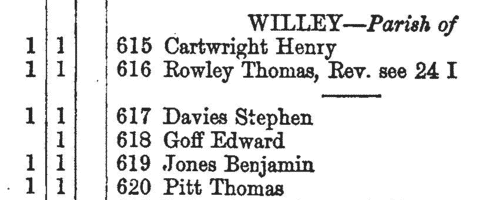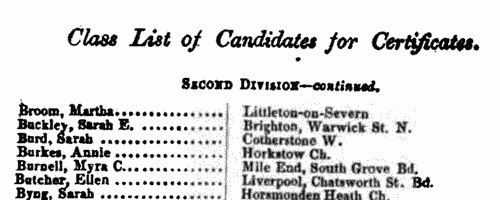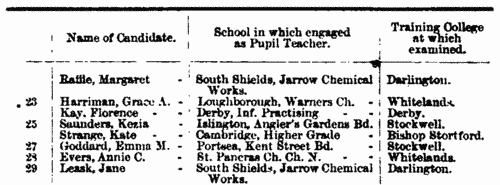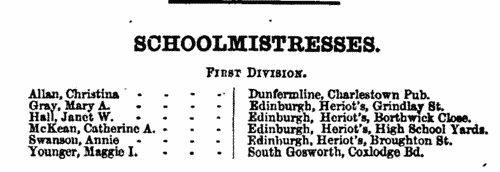Bould Surname Ancestry ResultsOur indexes 1000-1999 include entries for the spelling 'bould'. In the period you have requested, we have the following 110 records (displaying 61 to 70): Single Surname Subscription | | | Buying all 110 results of this search individually would cost £634.00. But you can have free access to all 110 records for a year, to view, to save and print, for £100. Save £534.00. More... |
These sample scans are from the original record. You will get scans of the full pages or articles where the surname you searched for has been found. Your web browser may prevent the sample windows from opening; in this case please change your browser settings to allow pop-up windows from this site. Dissolutions of Partnerships
(1854)
Trade partnerships dissolved, or the removal of one partner from a partnership of several traders: in England and Wales
BOULD. Cost: £6.00.  | Sample scan, click to enlarge

| Unclaimed Dividends
(1855)
The unclaimed dividend books of the Bank of England, containing names and descriptions of over 20,000 persons entitled to many millions of pounds accumulated in the bank unclaimed during the 18th and 19th centuries, mostly in consols and annuities, and transferred to the Commissioners for the Reduction of the National Debt.
BOULD. Cost: £6.00.  | Sample scan, click to enlarge

| Dissolutions of Partnerships
(1856)
Trade partnerships dissolved, or the removal of one partner from a partnership of several traders, in England and Wales
BOULD. Cost: £6.00.  | Sample scan, click to enlarge

| Traders and professionals in London
(1856)
The Post Office London Directory for 1856 includes this 'Commercial and Professional Directory', recording over 100,000 individuals. BOULD. Cost: £4.00.  | Sample scan, click to enlarge

|  Persons of standing recommending London police recruits
(1843-1857) Persons of standing recommending London police recruits
(1843-1857)
The Metropolitan Police Register of Joiners (MEPO 4/334) lists policemen joining the force 1 January 1843 to 1 April 1857 (warrant numbers 19893 to 35804). The register is alphabetical, in so far as the recruits are listed chronologically grouped under first letter of surname. It gives Date of Appointment, Name, Number of Warrant, Cause of Removal from Force (resigned, dismissed, promoted or died), and Date of Removal. Although the register was closed for new entrants at the end of 1842, the details of removals were always recorded, some being twenty or more years later. Those recruits not formerly in the police, the army, or some government department, were required to provide (normally) at least two letters of recommendation from persons of standing, and details of these are entered on the facing pages. Where a recruit was only recently arrived in the metropolis, the names and addresses of the recommenders can be invaluable for tracing where he came from. Those recruits not formerly in the police, the army, or some government department, were required to provide (normally) at least two letters of recommendation from persons of standing, and details of these are entered on the facing pages: the names in these are indexed here (the police recruits are indexed separately and not included here). Recruits transferred from other forces or rejoining the force did not normally need recommendations - in the latter case, former warrant numbers are given - but some recommendations are from police inspectors, even other constables. Recruits coming from the army sometimes have general military certificates of good conduct, but most often have a letter from their former commanding officer; recruits recommended by government departments (most often the Home Office) similarly have letters from the head of department. But the great majority of the names and addresses in these pages are of respectable citizens having some sort of personal acquaintance with the recruit. Where more than two recommendations were provided, the clerk would only record one or two, with the words 'and others'. Tradesmen are sometimes identified as such by their occupations; there are some gentry. Although the bulk of these names are from London and the home counties, a scattering are from further afield throughout Britain and Ireland. BOULD. Cost: £8.00.  | Sample scan, click to enlarge

|  British riflemen fighting in China
(1860) British riflemen fighting in China
(1860)
The China Medal was awarded to soldiers and sailors who took part in the prosecution of the war against the Chinese from 1856 to 1860. Separate clasps were awarded for men who had been in receipt of the China Medal of 1842; for being actually present at Canton on 28 and 29 December 1857, when that city was bombarded and finally captured; for being actually engaged in the operations which ceased with the first capture of the Taku Forts, 20 May 1858, and led to the Treaty of Tientsin; for being actually present at the capture of the Taku Forts 21 August 1860; and for being actually present before Pekin the day the gate of that city was given up to the allied (British and French) army, viz. on 13 October 1860. The 2nd battalion, the 60th (The King's Royal Rifle Corps) Regiment, based in Winchester, embarked for the Cape of Good Hope in June 1851, and after taking part in the Kaffir War, was moved to India, where it helped deal with the Mutiny. In 1860 the battalion was transferred to China. The regiment took part in the capture of the Taku Forts and that of Pekin.BOULD. Cost: £8.00.  | Sample scan, click to enlarge

| South Shropshire Poll Book: Frodesley
(1868)
The poll book of the election, November 1868, for the Southern Division of Shropshire, is arranged by polling district, and then by parish, township, &c., showing the votes cast (H, Herbert; C, Corbett; M, More), the number on the electoral register, and the full name of the voter, surname first. Where a person had voting qualification in more than one parish, the name is given in each place, but with a cross-reference to the parish list with the entry the vote(s) cast. At the head of each column of register numbers there is a letter in bold indicating the polling district - A, Bishop's Castle; B, Bridgnorth; C, Church Stretton; D, Cleobury Mortimer; E, Clun; F, Ludlow; G, Pontesbury; H, Shiffnal; I, Wenlock.BOULD. Cost: £6.00.  | Sample scan, click to enlarge

| Trainee Schoolmasters at Saltley
(1875)
The Education Department set examinations of trainee teachers at the various training colleges in Britain. This is the class list of the men who took examinations at Saltley Teacher Training College at Christmas 1875. The names are given for the second year first, arranged by division in the examination (in order of merit for the first and second divisions), and then for the students of the first year, arranged similarly. Full names are given (with initials for middle names). The letter (D.) indicates that the candidate had obtained a certificate of competency as a teacher of drawing. (The sample scan is from a general class list for schoolmistresses)BOULD. Cost: £6.00.  | Sample scan, click to enlarge

| Trainee Schoolmistresses in England and Wales
(1877)
The Education Department set examinations for candidates for admission into training colleges, and for the office of teacher. This is the list of successful female candidates from England and Wales at the examination at Midsummer 1877. The number in the first column shows order of merit in each class in the examination; then there is the name of the candidate (surname, christian name and any intermediate initial(s)), the school in which engaged, and the training college at which examined. The names of pupil teachers are shown in italics, with the 'school in which engaged' column left blank. These abbreviations are used in the names of schools: B., British; Bd., Board; Ch., Church of England; N., National; P., Parochial; R. C., Roman Catholic; U., Poor Law Union; W., Wesleyan Methodist.BOULD. Cost: £6.00.  | Sample scan, click to enlarge

| Trainee Schoolmistresses at Warrington
(1878)
The Education Department set examinations of trainee teachers at the various training colleges in Britain. This is the class list of the women who took examinations at the Teacher Training College at Christmas 1878. The names are given for the second year first, arranged by division in the examination (in order of merit for the first and second divisions), and then for the students of the first year, arranged similarly. Full names are given (with initials for middle names). The letter (D.) indicates that the candidate had obtained a certificate of competency as a teacher of drawing. (The sample scan is from a general class list for schoolmistresses)BOULD. Cost: £6.00.  | Sample scan, click to enlarge

|
Research your ancestry, family history, genealogy and one-name study by direct access to original records and archives indexed by surname.
|













